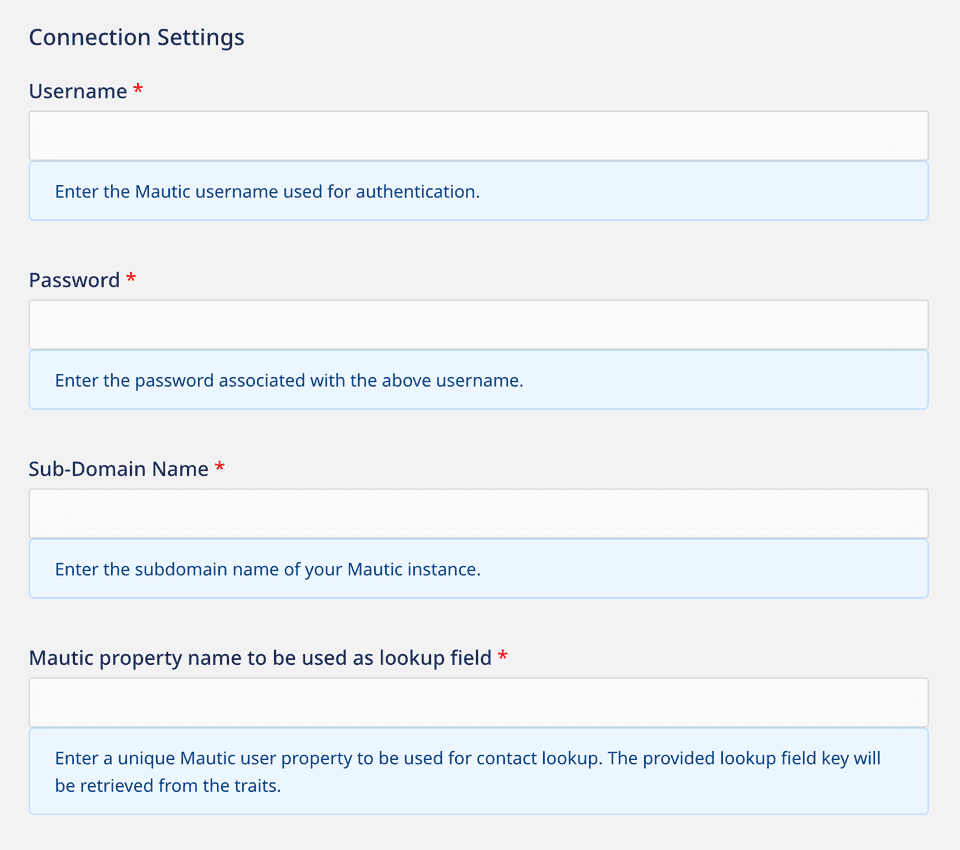Mautic is an open-source marketing automation platform. It enables you to segment your contacts based on business requirements, personalize your marketing strategy, and create personalized campaigns for better customer engagement.
RudderStack supports Mautic as a destination where you can seamlessly send your event data.
Getting started
Before configuring Mautic as a destination in RudderStack, verify if the source platform is supported by Mautic by referring to the table below:
| Connection Mode | Web | Mobile | Server |
|---|---|---|---|
| Device mode | - | - | - |
| Cloud mode | Supported | Supported | Supported |
Once you have confirmed that the source platform supports sending events to Mautic, follow these steps:
- From your RudderStack dashboard, add a source. Then, from the list of destinations, select Mautic.
- Assign a name to the destination and click Continue.
Connection settings
To successfully configure Mautic as a destination, you will need to configure the following settings:

- Username: Enter the username associated with your Mautic account.
- Password: Enter the password for the above username.
- Subdomain Name: Enter the subdomain associated with your Mautic instance. For example, if the root URL for your Mautic instance is
customdomain.domain.com, then your subdomain name will becustomdomain. - Mautic property name to used as lookup field: Enter a unique Mautic user property which RudderStack will use for contact lookup.
Identify
You can use the identify call to create or update a user in Mautic.
A sample identify call is shown below:
rudderanalytics.identify("1hKOmRA4GRlm", { state: "Louisiana", firstName: "Alex", lastName: "Keener", title: "Mr", zipcode: "90009", prospectOrCustomer: "Customer", country: "USA", website: "www.alex.com", subscriptionStatus: "New", phone: "12025550146",});Supported mappings
The following table lists the mappings between the optional RudderStack and Mautic properties:
| RudderStack property | Mautic property | Data type |
|---|---|---|
context.traits.email / traits.email / properties.email/context.externalId.id | email | String |
traits.title / context.traits.title | title | String |
traits.firstName / traits.firstname / traits.first_name / context.traits.firstName / context.traits.firstname / context.traits.first_name | firstname | Any |
traits.lastName / traits.lastname / traits.last_name / context.traits.lastName / context.traits.lastname / context.traits.last_name | lastname | Any |
originalTimestamp / timestamp | last_active | Timestamp in ISO 8601 format |
phone | phone / mobile | Any |
traits.address.city | city | String |
traits.address.addressLine1/ context.traits.address.addressLine1 | address1 | String |
traits.address.addressLine2/ context.traits.address.addressLine2 | address2 | String |
traits.address/ context.traits.address | address1 + address2 | String |
traits.company.employeeCount | company_size | Integer |
traits.role / context.traits.role | role | String |
traits.website / context.traits.website / properties.website | website | String |
context.ip | IP | String |
context.timezone | timezone | String |
traits.subscriptionStatus / context.traits.subscriptionStatus | subscription_status | String |
traits.prospectOrCustomer / context.traits.prospectOrCustomer | prospect_or_customer | String |
traits.hasPurchased / context.traits.hasPurchased | haspurchased | String |
traits.state/ context.traits.state | state | String |
traits.zipcode / context.traits.zipcode / traits.zip / context.traits.zip | zipcode | String |
traits.country / context.traits.country | country | String (Starting with a capital letter) |
Getting contact details
The easiest way to retrieve contact details of an existing user in Mautic is by specifying the unique user trait in the Mautic property name to used as lookup field dashboard setting. RudderStack will look for this property in the event's traits or context.traits and use the value for contact lookup.
If the events do not contain the property specified in the above setting, then:
- RudderStack uses the
emailproperty in the event. - If
emailis not present, RudderStack then creates a new contact in Mautic.
Optionally, you can also pass the contact ID in your event's externalId, as shown:
{ "context": { "externalId": [{ "type": "mauticContactId", "id": "1hKOmRA4GRlm" }] }}externalId.type is set to mauticContactId before using the id field for contact lookup.externalId takes precedence over the user property specified in the Mautic property name to used as lookup field dashboard setting.Group
You can use the group call to link or delink a Mautic contact with a segment, campaign, or a company.
A sample group call is shown below:
rudderanalytics.group("group01", { "name": "Alex Keener", "type": "Segments", "operation": "add"});RudderStack uses the type trait present in the group call to link or delink a Mautic user to a segment, campaign, or company. You can add or remove a user to a group using the operation trait. If this field is not explicitly set, RudderStack sets it to add by default.
The following table lists the supported group traits:
| RudderStack property | Presence | Notes |
|---|---|---|
traits.type | Required | You can set it to Segments, Campaigns, or Companies. |
traits.operation | Optional | If not set, RudderStack sets it to add by default. |
Similar to the identify call above, RudderStack retrieves the contact ID from the group call in the following order of precedence:
- If
externalIdis present, RudderStack checks if thetypeis set tomauticContactId. If yes, it uses theidfield for the contact lookup. - If you have specified a unique user property in the Mautic property name to used as lookup field dashboard setting, RudderStack will look for this property in the event's
traitsorcontext.traitsand use it for the contact lookup. - If the events do not contain the property specified in the above setting, then:
- RudderStack uses the
emailproperty in the event. - If
emailis not present, RudderStack then gives an error.
- RudderStack uses the
Supported mappings
The following table lists the mappings between the RudderStack and Mautic properties:
| RudderStack property | Mautic property | Data type | Presence |
|---|---|---|---|
groupId/traits.groupId | SegmentId | ||
message.context.externalId.id | CONTACT_ID |
| RudderStack property | Mautic property | Data type | Presence |
|---|---|---|---|
groupId/traits.groupId | CampaignId | ||
message.context.externalId.id | CONTACT_ID |
| RudderStack property | Mautic property | Data type | Presence |
|---|---|---|---|
groupId/traits.groupId | company_id | ||
message.context.externalId.id | CONTACT_ID |
Contact us
For more information on the topics covered on this page, email us or start a conversation in our Slack community.